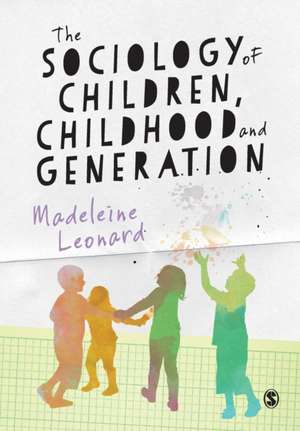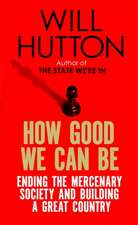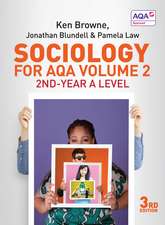The Sociology of Children, Childhood and Generation
Autor Madeleine Leonarden Limba Engleză Paperback – 14 dec 2015
Examining children’s involvement in areas such as the labour market, family life, education, play and leisure, the book provides an effective balance between understanding childhood as a structural phenomenon, and recognising children as meaning makers actively involved in constructing, co-constructing and reconstructing their everyday lives.
Through the concept of 'generagency' Madeleine Leonard offers a model for examining and illuminating how structure and agency are activated within interdependent relationships influenced by generational positioning. This framework provides a conceptual tool for thinking about the continuities, challenges and changes that impact on how childhood is lived and experienced.
| Toate formatele și edițiile | Preț | Express |
|---|---|---|
| Paperback (1) | 329.46 lei 22-36 zile | +9.25 lei 6-12 zile |
| SAGE Publications – 14 dec 2015 | 329.46 lei 22-36 zile | +9.25 lei 6-12 zile |
| Hardback (1) | 901.96 lei 43-57 zile | |
| SAGE Publications – 14 dec 2015 | 901.96 lei 43-57 zile |
Preț: 329.46 lei
Nou
Puncte Express: 494
Preț estimativ în valută:
63.04€ • 65.99$ • 52.47£
63.04€ • 65.99$ • 52.47£
Carte disponibilă
Livrare economică 10-24 martie
Livrare express 22-28 februarie pentru 19.24 lei
Preluare comenzi: 021 569.72.76
Specificații
ISBN-13: 9781446259245
ISBN-10: 1446259242
Pagini: 184
Dimensiuni: 170 x 242 x 15 mm
Greutate: 0.09 kg
Ediția:1
Editura: SAGE Publications
Colecția Sage Publications Ltd
Locul publicării:London, United Kingdom
ISBN-10: 1446259242
Pagini: 184
Dimensiuni: 170 x 242 x 15 mm
Greutate: 0.09 kg
Ediția:1
Editura: SAGE Publications
Colecția Sage Publications Ltd
Locul publicării:London, United Kingdom
Recenzii
Leonard’s The Sociology of Children, Childhood and Generation offers a thorough and up to date critical review of current debates in the sociology of childhood. Both those new to the field and more seasoned scholars will find much useful insight and food for thought in this book. Leonard’s introduction of generagency (and its subdivisions, inter- and intra-generagency) provides a useful and productive conceptual tool for theorizing the interdependent relationship between generation and agency. The book makes a clear contribution to the sociology of childhood and to Childhood Studies at large.
This is a lucid overview as well as an outstanding synthesis of the field of childhood sociology. Also, the book offers an original contribution to theorizing children’s agency.
This book contributes to a more comprehensive framework for bridging childhood as a structural component of society and children as active agents. Indeed, agency is best viewed as relational and not as a possession of individuals. But how to conceptualize this is far from easy. In clearly written and coherently ordered chapters, Madeleine Leonard brings an informed state of the art to the reader’s knowledge. Going through studies of children’s everyday lives in the family, at work, in educational systems and during leisure time, she shows the ambiguity of the concept of agency, which has especially important consequences in the implementation of children’s rights. The author also uncovers critical issues in the new sociology of childhood, like the limited micro-level changes that constitute most of the empirical proof of children’s agency. Her call for more accurate conceptualizations going past an over-romanticized notion of childhood is relevantly answered by her own original developments, giving perspective to her former research. The focus on children’s active influence in generational relationships help move beyond what is too often conceived of as dichomoties (adult/child, structure/agency). The concept of generagency illuminates agency as part of children’s relationships with adults among them. This book addresses a large audience of readers and authors interested by unresolved tensions in theorising and understanding children and childhood.
Madeleine Leonard’s excellent book highlights the most important issues and concepts in the debates of sociology of childhood in a clear and concise way, and without renouncing to portray their nuances. The book describes and explains the distinction and the connections between social structures and children’s agency; it presents the controversial attempts to account for both the restrictions and the promotion of children’s participation opportunities in relationships within the most important social contexts. In particular, the book introduces a new, remarkable concept: generagency (and its core dimensions); this is a welcome attempt to clarify the complexity of links among social structures, children’s agency and generational relationships, as well as a useful theoretical tool for guiding empirical research on the heterogeneity of children’s social lives.
I am sometimes a little wary of projects that seek to prioritise one discipline at the expense of others, but I actually found this book to be extremely helpful and interesting and am convinced it makes a very valuable contribution to the literature.
The book is clearly written in an accessible style that would appeal to a variety of audiences, particularly undergraduates taking specialist courses in the latter part of their degree programmes, and postgraduates requiring a brief but high level introduction to the sociology of childhood. Each chapter includes a set of aims and learning outcomes, along with helpful questions for discussion, which would also work well as essay titles.
Any research or way of thinking or reflecting on the lives of children and how childhood is shaped is worth reading, and this is no exception, because it would certainly reward your attention.
The bookmakes a significant contribution to the literature by studyingchildren and childhood because they are worthy subjects ontheir own. The book does not seek to examine children onlyby comparing them to adults. The implications of this bookare profound.
This is a lucid overview as well as an outstanding synthesis of the field of childhood sociology. Also, the book offers an original contribution to theorizing children’s agency.
This book contributes to a more comprehensive framework for bridging childhood as a structural component of society and children as active agents. Indeed, agency is best viewed as relational and not as a possession of individuals. But how to conceptualize this is far from easy. In clearly written and coherently ordered chapters, Madeleine Leonard brings an informed state of the art to the reader’s knowledge. Going through studies of children’s everyday lives in the family, at work, in educational systems and during leisure time, she shows the ambiguity of the concept of agency, which has especially important consequences in the implementation of children’s rights. The author also uncovers critical issues in the new sociology of childhood, like the limited micro-level changes that constitute most of the empirical proof of children’s agency. Her call for more accurate conceptualizations going past an over-romanticized notion of childhood is relevantly answered by her own original developments, giving perspective to her former research. The focus on children’s active influence in generational relationships help move beyond what is too often conceived of as dichomoties (adult/child, structure/agency). The concept of generagency illuminates agency as part of children’s relationships with adults among them. This book addresses a large audience of readers and authors interested by unresolved tensions in theorising and understanding children and childhood.
Madeleine Leonard’s excellent book highlights the most important issues and concepts in the debates of sociology of childhood in a clear and concise way, and without renouncing to portray their nuances. The book describes and explains the distinction and the connections between social structures and children’s agency; it presents the controversial attempts to account for both the restrictions and the promotion of children’s participation opportunities in relationships within the most important social contexts. In particular, the book introduces a new, remarkable concept: generagency (and its core dimensions); this is a welcome attempt to clarify the complexity of links among social structures, children’s agency and generational relationships, as well as a useful theoretical tool for guiding empirical research on the heterogeneity of children’s social lives.
I am sometimes a little wary of projects that seek to prioritise one discipline at the expense of others, but I actually found this book to be extremely helpful and interesting and am convinced it makes a very valuable contribution to the literature.
The book is clearly written in an accessible style that would appeal to a variety of audiences, particularly undergraduates taking specialist courses in the latter part of their degree programmes, and postgraduates requiring a brief but high level introduction to the sociology of childhood. Each chapter includes a set of aims and learning outcomes, along with helpful questions for discussion, which would also work well as essay titles.
Any research or way of thinking or reflecting on the lives of children and how childhood is shaped is worth reading, and this is no exception, because it would certainly reward your attention.
The bookmakes a significant contribution to the literature by studyingchildren and childhood because they are worthy subjects ontheir own. The book does not seek to examine children onlyby comparing them to adults. The implications of this bookare profound.
Cuprins
Chapter 1: Introduction
Chapter 2: Becoming and Being - Developments in the Sociology of Childhood
Chapter 3: Macro Childhoods - Prioritising Structure
Chapter 4: Micro Childhoods - Prioritising Agency
Chapter 5: From Rights to Citizenship - Transformations and Constraints
Chapter 6: Bridging Structure and Agency - Bringing in Inter-generagency and Intra-generagency
Chapter 7: Conclusion - Blurred Boundaries
Chapter 2: Becoming and Being - Developments in the Sociology of Childhood
Chapter 3: Macro Childhoods - Prioritising Structure
Chapter 4: Micro Childhoods - Prioritising Agency
Chapter 5: From Rights to Citizenship - Transformations and Constraints
Chapter 6: Bridging Structure and Agency - Bringing in Inter-generagency and Intra-generagency
Chapter 7: Conclusion - Blurred Boundaries
Notă biografică
Descriere
An accessible exploration of the macro/micro question in relation to the sociology of childhood. A thoughtful yet approachable textbook with broad appeal across the social sciences.












